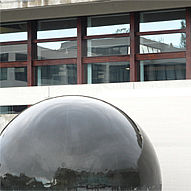
Profile
This Master is a continuation to bachelor’s degree programs with focus on political science. It considers both the scientific-theoretical dimension and the practical analysis of the functioning of modern democracies. He sees himself as a normative, applied and practice-oriented science that makes an active contribution to shaping democratic communities.
The Regensburg study program "Democracy Studies" focuses both on the theoretical dimension of democracy - as one of the oldest areas of discussion in political science - as well as the practical analysis of democracies in modern times. The designation of the program refers to the normative traditions of the subject: After the Second World War, the founding fathers of modern German political science (including Arnold Bergstraesser, Ernst Fraenkel, Dolf Sternberger) established the discipline with the aim of serving the reconstruction of democracy destroyed by National Socialism , Consequently, they did not understand political science as a mere value-free empirical science, but also as a discipline that had to adopt scientifically founded positions in political debates and publicly represent them in the interests of the common good. The normative standard here is the credo of Western democratic tradition, which today found its concrete form in the Freedom Democratic Basic Order. More recent considerations, especially in connection with transition research, extend this western reference standard. The focus is on the development of specific explanatory patterns and standards for non-Western regions (Eastern Europe, Latin America, Asia, Arabia) and for the European Union, which can be applied as generalizing patterns to other regions. Thus, based on normative and empirical teachings, democracies - but also non-democracies - are compared and their strengths and weaknesses are accounted for.
The Master's Degree Program "Democracy Studies" bears his name, because political science in Regensburg is understood in the sense of this tradition as a normative, application-oriented and practice-oriented science that has to make an active contribution to shaping our democratic society.
Institute of Political Science
Room PT, Zi. 3.1.53
Phone 0941 943-3601
Email
Office hours



